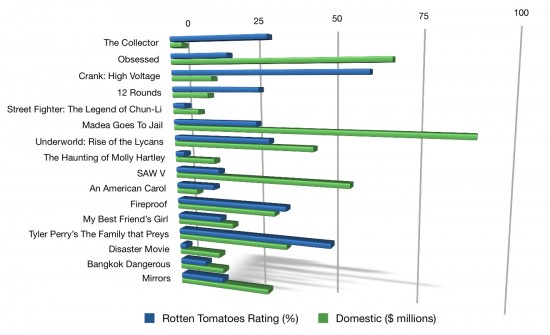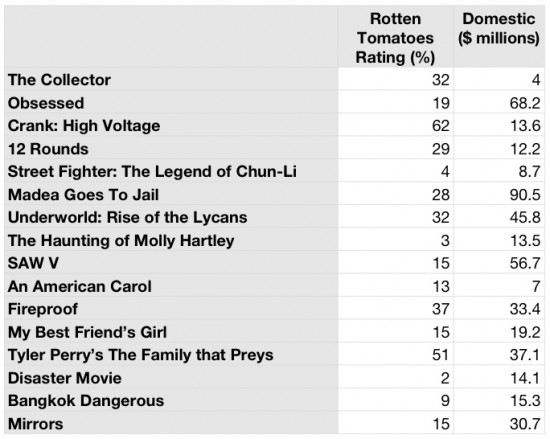By The Numbers: Movies Not Screened For Nationwide Press
Paramount Pictures has decided to not invite critics to the nationwide screenings of G.I. Joe: The Rise of Cobra, in what one might suspect is an attempt to quash bad reviews. A very targeted select group of online outlets were chosen to screen the film (were any women invited?), and the buzz coming out of their reports has been surprising – the movie isn't horrible, it might even be a little fun. So why isn't Paramount screening GI Joe to press if the few critics that did see the film enjoyed it? It's a question that has been the subject of conversation in the movie geek circles on Twitter last week.
But the bigger question is... does not screening a film for critics mean that a movie is bad? In today's by the numbers, I take a look at the films released over the last year that were not screened for critics. And by not screened, I should clarify — I mean outside of NY/LA junket screenings.
The graph above shows the 16 films from the last 12 months that weren't screened for critics nationwide. Click on the image to enlarge.
Of the 16 films, only one has a certified "fresh" rating from Rotten Tomatoes (Crank 2: High Voltage with a 62%). The 16 films together (including Crank 2) have an average Rotten Tomatoes rating of 22.9%. If Crank 2 proves anything, it proves that a decent movie can slip through the cracks when a studio's marketing department lack's faith or marketing budget.
GI Joe: The Rise of Cobra certainly doesn't lack finances. According to a recent LA Times article, the film had a production budget of $175 million, and Paramount is expected to spend $150 million in marketing and distribution expenses. In fact, Paramount is still holding the usual word of mouth "advance screenings" in most of the major cities around the country. For those who don't know, these are the screenings that regional press and critics are normally invited to. Press just wasn't invited this time around.
Some lower budget horror films don't hold any word of mouth screenings, possibly because it would be too cost prohibitive. In that instance, it doesn't make any sense to screen a movie for critics, as it would be too costly to set-up screenings in all the major cities across the country. Plus, lets be honest: for the most part, critic attendance at the lower budget horror films is minimal (at least from what I can tell in San Francisco). But if a studio believes they have something good, like The Descent, they will promote and screen the film to critics.
And even if the film was a clunker, it isn't like the bad buzz fuming out of critic reviews is going to hurt the film. For a recent example of this, look back at Transformers: Revenge of the Fallen, which was slammed hard by most critics, very possibly ending up as the worst reviewed biggest box office success of all time. Remember that old saying, "There is no such thing as bad publicity?" Well it very much applies to these big budget event films.
In fact, I was unable to find a history of huge budget films not being screened for the press. The only possible example I could find was the 1995 film Waterworld (I'm sure there might be other examples I'm missing, if so, leave them in the comments). Usually when a film costs more than $100 million, studios screen it because they know – any publicity is good publicity.
While critics serve to help smaller budget and independent films, their positive or negative opinions don't seem to help hurt bigger budget releases. But the reviews do function as a form of publicity ("hey look, Transformers 2 is coming out this weekend") which helps add to the event release. Do you know how much a strip in the New York Times would cost the studio if they wanted advertise in the same space where a movie review would run? A lot. Reviews are basically free advertising for these bigger films.
I could argue for or against the value of movie reviews all day, but that isn't what this article is about. The question is: why isn't Paramount screening GI Joe to nationwide critics? They weren't afraid to screen Transformers 2, and we all know how that one turned out. So what are they afraid of this time around?
A very special thanks to Rotten Tomatoes' Critical Consensus column, which was a valuable resource for discovering which films were not screened to the national press.
Update: /Film reader Ian F decided to do some extra work and add box office gross to the graph, in an effort to see if not being screened for critics hurt or helped these films. I would argue that you would need to see a comparison between comparable reviewed films that were screened for press to get an accurate read out. But who has the time to put together such a report? Not me. Here are Ian's findings:


